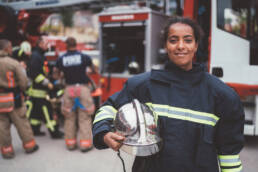
Topics & Training
Education & Consulting for Helping Professionals
Foundational Training
If this is the first time your organization is offering TEND education, we recommend that you begin by offering our foundational trainings.
These sessions are designed to provide participants with the language to talk about the concepts that are central to well-being in the helping professions.

Key Learnings
- Identify your risk factors for secondary traumatic stress and empathic strain.
- Develop strategies to take stock, reduce trauma exposure, and reset.
- Make a plan for sustainable change.
Secondary Traumatic Stress & Empathic Strain
Understanding the Foundational Concepts of Trauma-Exposed Work
ALL STAFF | TRAUMA-EXPOSED PROFESSIONS | NO PREREQUISITES
Overview
How do we stay well when bearing witness to suffering? What is the impact of hearing, seeing, and reading about trauma daily? Chronic exposure to difficult stories can lead to experiences of secondary traumatic stress and empathic strain (also known as compassion fatigue).
These occupational hazards are normal and common – particularly when working with people in crisis. This training explores the impact of empathic strain and secondary trauma exposure on the physical and emotional well-being of helping professionals and offers strategies to stay well.

Key Learnings
- Identify the risk factors for work-related overwhelm.
- Recognize the impact of crisis situations and “wear & tear” on energy levels.
- Learn evidence-informed strategies to rest and refuel.
Chronic Stress
Managing Work-Related Exhaustion & Overwhelm
ALL STAFF | ALL PROFESSIONS | NO PREREQUISITES
Overview
Heavy workloads, intricate problems, and dwindling resources – these are challenges faced by today’s busy workplace. Despite this, our work requires us to be compassionate, focused, and creative. How do we think clearly and stay well in the face of exhaustion and depletion?
When experts discuss work-related stress, they often overlook an important contributing factor: plain old fatigue. This training provides strategies to manage the chronic “wear and tear” of working in a helping profession.

Key Learnings
- Understand trauma and identify myths and assumptions.
- Recognize the influence of Adverse Childhood Events (ACES) trauma on beliefs, thoughts, and actions.
- Learn best-practices for delivering trauma-sensitive care and preventing re-traumatization.
Trauma-Informed Care in Complex Workplaces
Understanding the Impact of Trauma on Service Provision
ALL STAFF | ALL PROFESSIONS | NO PREREQUISITES
Overview
Working with people with complex needs can be challenging. We all aim to offer responsive, ethical, and compassionate care. However, this is only possible when we recognize the pervasive impact of trauma on well-being. How do we promote a culture of safety, collaboration, and empowerment in a complex workplace?
Working in a trauma-informed way ensures better outcomes and healthier staff. This training provides foundational knowledge about trauma-informed care including the prevalence, presentation, and impact of trauma.
Questions? call (613) 539-2482
Skill Building & Essential Tools
Equip your teams with the skills and strategies to manage high-stress and trauma-exposed work. These sessions are focused on providing participants with practical and evidence-informed tools.
These essential strategies are for everyone on the team - frontline workers, middle management, senior leadership, and support staff.

Key Learnings
- Understand how stress affects our bodies and behaviours.
- Learn a useful framework for pausing and taking stock.
- Build a toolkit of micro-skills that can be used before, during, and after stressful situations.
Micro Skills
Key Tools to Stay Grounded and Centered
ALL STAFF | ALL PROFESSIONS | NO PREREQUISITES
Overview
What does it really mean to pause and reset? When working in complex workplaces, common “self-care” advice can be unhelpful and, at times, downright useless. How do we reset without that blissful three-hour break? How do we meaningfully recalibrate when working at the demanding pace that our professions often require?
Research in the field of traumatic stress suggests that self-awareness may be the key to preserving our ability to do this difficult work. This training provides simple, quick, and effective micro-skills to check-in and recalibrate throughout our day.

Key Learnings
- Understand the risk factors for work-related overwhelm.
- Recognize the impact of crisis situations and “wear & tear” on energy levels.
- Learn evidence-informed strategies to rest and refuel.
Debriefing & Mutual Support
Establishing & Embedding Communities of Support in Our Work
ALL STAFF | TRAUMA-EXPOSED PROEFSSIONS | SECONDARY TRAUMATIC STRESS & EMPATHIC STRAIN
Overview
Many professions use the term “debriefing” to describe protocols used to respond in the aftermath of critical events. Yet, there is confusion about which practices are helpful and healthy – and which ones may lead to further harm. How do we support one another while protecting ourselves from traumatic content? How do we embed regular check-ins for mutual support?
This training provides best practice recommendations for processing the distressing elements of our work. It also provides guidance on establishing communities of support and debriefing processes that consider critical incidents as well as the cumulative impact of on-going trauma exposure – which, due to its subtle nature, can often be overlooked.

Key Learnings
- “What if I’m adding to my team’s workload?” and other common concerns about setting boundaries.
- Recognize the consequences of poor boundary setting from an individual, group, and organizational perspective.
- Learn strategies to set and receive boundaries in a healthy way.
Boundaries
Setting & Maintaining Healthy Boundaries
ALL STAFF | ALL PROFESSIONS | NO PREREQUISITES
Overview
Many of us are drawn to this work by a desire to care for and help others. Our ability to extend empathy and compassion makes us great at our jobs – but what happens when we overextend this ability? When boundaries are poorly defined, too rigid, or completely absent, the consequences are felt by everyone – loved ones, team members, organizations, and the people we serve.
Research shows that healthy boundaries are a protective factor against the ill-effects of stressful work. This training provides strategies to set and maintain healthy boundaries.

Key Learnings
- Understand how past trauma and other contributing factors affect crisis reactions.
- Learn how to apply the eight steps of Psychological First Aid within specific workplace settings.
- Develop tools to manage a lack of closure and moral distress.
Psychological First Aid
Supporting Each Other Through Critical Incidents & Crisis
ALL STAFF | ALL PROFESSIONS | NO PREREQUISITES
Overview
How we help is just as important as what we do to help. Stress, grief, and past experiences have a powerful impact on a person’s ability to cope in the wake of traumatic events. When we have the skills to support others through a crisis, we can help to mitigate the lasting impacts of witnessing or experiencing trauma.
Psychological First Aid is an evidence-informed approach to providing emotional support to others. This training provides foundational skills in crisis support.

Key Learnings
- Understand the psychological & behavioural aspects of emotional escalation.
- Identify common challenges of verbal de-escalation and learn strategies to overcome them.
- Learn to recognize and manage your own heightened emotions.
Verbal De-escalation
Foundational Skills in Effectively Managing Emotional Escalation
ALL STAFF | ALL PROFESSIONS | NO PREREQUISITES
Overview
When working in a client-facing role, it is inevitable that we encounter frustrated, angry, or dissatisfied people. These interactions can range from uncomfortable to frightening. Without the skills and confidence to handle these situations, we run the risk of damaging our relationships with others and contributing to our own emotional exhaustion.
Verbal de-escalation is a set of practical skills that can lead to a safer, calmer workplace. This training provides foundational skills in de-escalating emotional and behavioural agitation.

Key Learnings
- Understand why conflict happens and recognize the dangers of unmanaged conflict.
- Identify common sources of conflict within teams.
- Learn strategies to effectively work with different conflict management styles.
Conflict Resolution
Foundational Skills in Making Conflict Work
ALL STAFF | ALL PROFESSIONS | NO PREREQUISITES
Overview
In today’s world of work, three things are certain: there will be change; there will be stress; and these two factors will lead to conflict. Unattended conflict can have a disastrous effect on the well-being of teams and organizations. How do we bring our teams together in the face of shifting mandates, resource shortages, and other stressors?
Healthy conflict can be a source of growth, opportunity, and success. This training provides foundational skills in conflict resolution.
Questions? call (613) 539-2482
Advanced Topics
Crafted by our team of specialists, these sessions take a deeper dive into intermediate and advanced topics. We recommend these sessions to staff who have taken our foundational training, or for professionals who are well-versed in topics relevant to staying well in high stress, trauma-exposed work.

Key Learnings
- Recognize the signs of hypervigilance, numbing out, and the “zealot phase.”
- Identify internal conflicts that lead to overwork and exhaustion.
- Develop protective strategies to build confidence and competence for a healthy, fulfilling career.
Career-Sustaining Behaviours
Advanced Training on Secondary Traumatic Stress & Empathic Strain
ALL STAFF | TRAUMA-EXPOSED PROEFSSIONS | SECONDARY TRAUMATIC STRESS & EMPATHIC STRAIN
Overview
Full workdays, trauma exposure, and administrative roadblocks can leave us feeling drained and, at times, disillusioned. Yet, we may remember a time when we felt inspired and energized by our career choice. How do we recapture our sense of satisfaction and fulfilment? What can we learn from those in our fields who seem to stay well no matter the circumstance?
Research has shown that by engaging in career-sustaining behaviours, we can stay compassionate and present throughout our careers. This training provides strategies to incorporate these behaviours into our work and lives.

Key Learnings
- Recognize the difference between moral dilemmas and moral distress.
- Understand the consequences of unresolved moral distress.
- Learn strategies to recognize and address moral distress from an individual, team, and organizational perspective.
Moral Distress
Recognizing and Addressing Moral Distress
ALL STAFF | TRAUMA-EXPOSED PROEFSSIONS| SECONDARY TRAUMATIC STRESS & EMPATHIC STRAIN
Overview
We are being asked to do more with less while navigating systems that are more complex than ever before. Sometimes, we are unable to provide the resources or support that an individual requires due to rules, policies, laws, or gaps in resources. As a result, our workplace can become fraught with unhappiness, frustration, and contempt.
Moral distress happens when we know the “right thing” to do – but we are unable to act on it. This training provides strategies and resources to recognize and address moral distress.

Key Learnings
- Understand the difference between resilience and post-traumatic growth.
- Recognize the dangers of going too fast, or the “flight into health.”
- Learn strategies to foster post-traumatic growth and well-being.
Post-Traumatic Growth
How Trauma Shifts Our Priorities in Work & Life
ALL STAFF | ALL PROFESSIONS | NO PREREQUISITES
Overview
Post-traumatic growth describes the positive change that some people experience in the wake of trauma. However, post-traumatic growth is often misunderstood. When used incorrectly, this term can lead to harmful messages of shame and blame – particularly when others do not cope well after a crisis. How do we assist our teams through a difficult event with kindness and compassion?
This training explores post-traumatic growth from an individual and organizational perspective. It provides strategies to foster well-being in the wake of trauma.
Questions? call (613) 539-2482